May 18, 2025 | 15:42 GMT +7
May 18, 2025 | 15:42 GMT +7
Hotline: 0913.378.918
May 18, 2025 | 15:42 GMT +7
Hotline: 0913.378.918
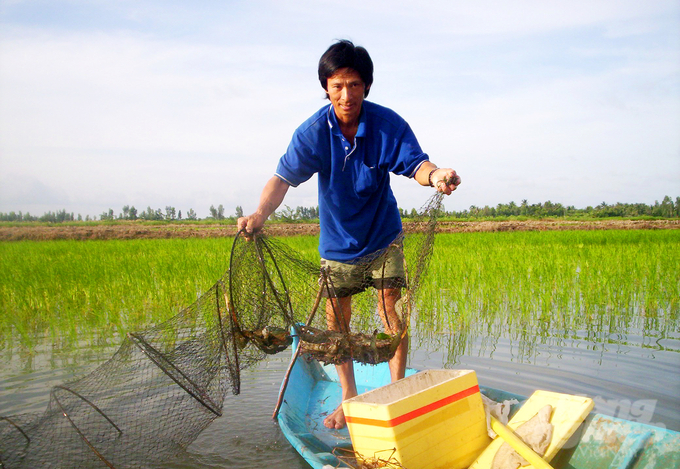
Rice-shrimp production is a unique, 'natural' form of agricultural cultivation associated with the Mekong Delta, helping people adapt in harmony with nature. Photo: Le Hoang Vu.
Adopting a "nature-based" approach to rice cultivation is a crucial and sustainable trend that provides numerous advantages, successfully accomplishing both economic and environmental objectives. The objective of this method is to guarantee the safety and safeguard the future of the Mekong Delta region in the face of progressively intricate climate change.
This key message was highlighted at an international workshop on "Agricultural-Food Systems, Health, and Cultural-Natural Heritage in the Delta Region," recently organized by An Giang University (a member of Vietnam National University, Ho Chi Minh City) in collaboration with the UK Government's Research and Innovation Fund and Newcastle University (UK) in An Giang.
According to Professor Andy Large, the project director at Newcastle University, the research findings from the "Living Deltas Hub" project's three main components for the period of 2019-2024 indicate that adopting a nature-based approach to agriculture is not solely an economic matter, but also has strong connections to the local history, society, and culture. This strategy is not only applicable to the current situation but also to future generations of the Mekong Delta region, in accordance with Resolution 120 on the sustainable development of the Mekong Delta, which aims to adapt to climate change.
Professor Andy Large states that the Mekong Delta is Vietnam's most extensive region for agricultural output, with almost 3 million hectares that are specifically allocated for agriculture and aquaculture. The agricultural production in the Mekong Delta region constitutes more than 50% of the country's overall output, making a significant contribution of over 70% to the production of fruits and aquatic products, as well as 90% to the nation's rice exports. In addition to its agricultural significance, the Mekong Delta is also abundant in biodiversity.
Nevertheless, the Mekong Delta is confronted with a multitude of obstacles, such as unsustainable development, the repercussions of upstream hydropower on the Mekong River, and the effects of climate change. Moreover, the region is confronted with substantial obstacles posed by climate change, including alterations in precipitation patterns and heightened occurrences of drought and saline intrusion. These factors have a detrimental impact on the territory's development prospects and the long-term sustenance of its inhabitants.
Professor Andy Large stressed the immediate necessity of addressing climate change through nature-based solutions. The Mekong Delta localities have been implementing a range of nature-based agricultural practices. These include a sustainable development project that aims to cultivate 1 million hectares of high-quality, low-emission rice by 2030, which is linked to promoting green growth in the region. Other practices include climate-smart rice farming models, the use of organic fertilizers and biological plant protection products, circular farming, under-forest economy, and the rice-shrimp model.
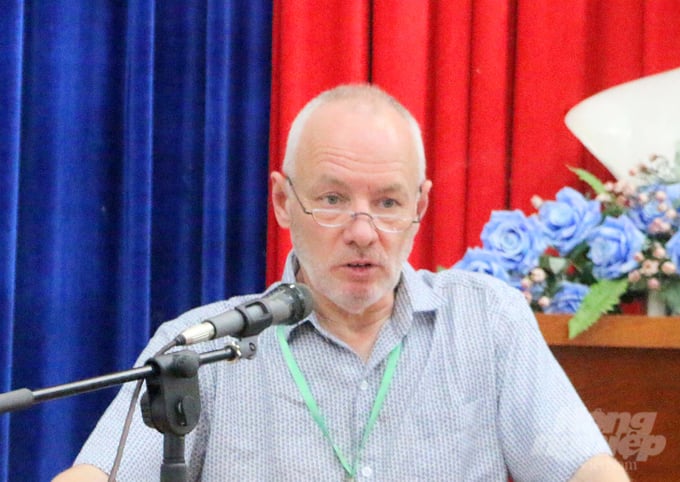
According to Professor Andy Large, Project Director - Newcastle University (United Kingdom), agricultural development according to "thuan thien" is an economic story and imbued with historical, social and cultural elements. Mekong Delta region. Photo: Le Hoang Vu.
Dr. Nguyen Van Kien, project leader at An Giang University (Vietnam National University, Ho Chi Minh City), supports this perspective by asserting that ecological and organic rice farming is a distinctive agricultural method rooted in nature, specifically linked to the Mekong Delta. It facilitates the harmonic and controlled adjustment of humans to the laws of nature, resulting in benefits for individuals and the preservation of ecosystems.
Dr. Kien stated that the infrastructure to support the growth of organic agriculture, including organic rice, is already established and is considered an essential consumer trend. Nevertheless, the economic worth of nature-based agricultural production remains relatively low, resulting in limited benefits for farmers.
Professor Vo Tong Xuan, the honorary rector of Nam Can Tho University, also emphasized the need of adopting low-carbon rice production as a means to promote sustainable agriculture in the Mekong Delta region.
Professor Vo Tong Xuan advised that the sustainable development project for 1 million hectares of high-quality, low-emission rice in the Mekong Delta should be implemented by 2030. This project should adopt an organic, nature-based approach by utilizing alternate wetting and drying irrigation techniques and following the "one must, five reductions" principle.
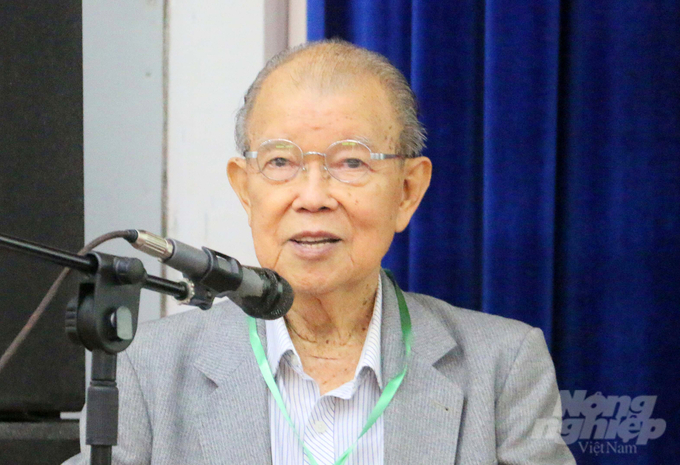
Prof. Dr. Vo Tong Xuan said that to develop sustainable agriculture, people in the Mekong Delta must aim for low-carbon rice production. Photo: Le Hoang Vu.
By 2030, if farmers in the Mekong Delta use efficient organic farming techniques over the entire 1.9 million hectares of rice fields, it will result in an annual reduction of almost 11 million tons of CO2e emissions in the region's rice sector. Additionally, repurposing 70% of the straw for other uses will result in a 50% reduction in greenhouse gas emissions compared to incinerating the straw.
"In addition, the Mekong Delta has the potential to decrease its carbon dioxide equivalent (CO2e) emissions by 12-23 million tons through the implementation of climate-resilient farming techniques and improved agricultural practices. This may be achieved by replacing inefficient rice fields with smart farming systems and implementing better straw management strategies", Professor Vo Tong Xuan stressed.
Provinces in the Mekong Delta are implementing the sustainable development project for 1 million hectares of high-quality, low-emission rice. An Giang province targets 44,051 hectares by 2025, expanding to 152,198 hectares by 2030.
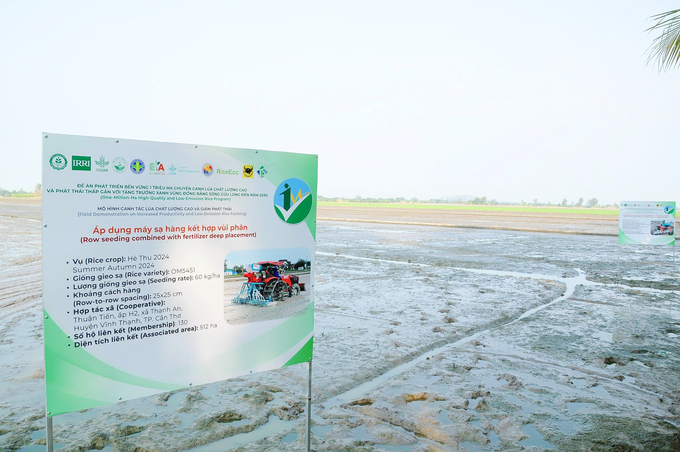
Launching the Sustainable Development Project of 1 million hectares specializing in high-quality rice cultivation associated with green growth in the Mekong Delta in Vinh Thanh district, Can Tho city. Photo: Le Hoang Vu.
Ms. Nguyen Thi Minh Thuy, Vice Chairwoman of An Giang Province, announced plans to reorganize production along the value chain, applying sustainable practices to enhance farmers' income, reduce emissions, adapt to climate change, and protect the environment. The province aims to create a model value chain for the rice industry by 2030.
By 2025, An Giang aims to reduce chemical fertilizers, chemical-based plant protection products, and irrigation water use by 20%, with a further 30% reduction by 2030. Sustainable farming techniques, such as "one must, five reductions" (1M5R) and alternate wetting and drying irrigation, will be adopted. Certification and planting area codes will ensure compliance with sustainable standards.
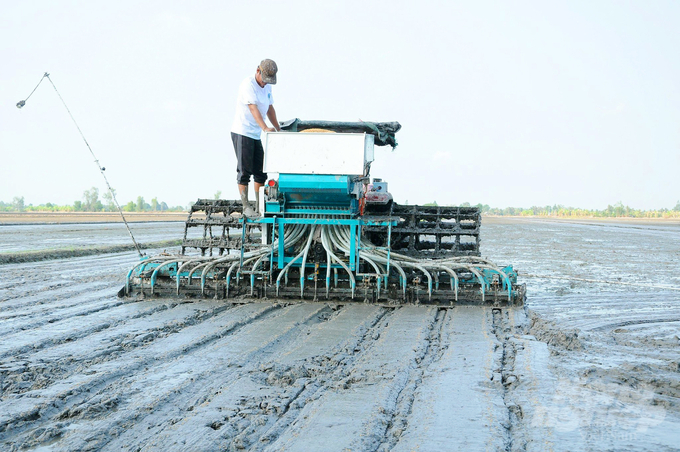
An Giang aims to have an area of 44,051 hectares participating in the high-quality, low-emission rice cultivation project by 2025 and continue replicating it in favorable areas. Photo: Le Hoang Vu.
From 2025 to 2030, An Giang aims for 100% of high-quality, low-emission rice areas to have linkages between businesses and farmer organizations, with 50-70% of the land mechanized and post-harvest losses below 8-10%. Additionally, 35,000-100,000 farming households are expected to adopt sustainable practices, with 70-100% of straw repurposed as organic fertilizer.
The project aims to reduce greenhouse gas emissions by over 10% compared to traditional cultivation by 2030, increase the value added in the rice value chain by 30-40%, and achieve a profit margin above 40-50% for farmers. High-quality, low-emission rice exports are expected to exceed 20% of total exports from the specialized regions.
During the project's launch in Can Tho City, Deputy Minister of Agriculture and Rural Development Tran Thanh Nam emphasized the benefits for all participants and called for enterprises to help establish a value chain aimed at reducing emissions and adapting to climate change.
Translated by Linh Linh

(VAN) The decree on Extended Producer Responsibility (EPR) ensures transparent management and disbursement of support funds, avoiding the creation of a “give-and-take” mechanism.

(VAN) Hue City rigorously enforces regulations regarding marine fishing and resource exploitation, with a particular emphasis on the monitoring of fishing vessels to prevent illegal, unreported, and unregulated (IUU) fishing.

(VAN) Hanoi People's Committee has issued a plan on reducing greenhouse gas emissions in the waste management sector with 2030 vision.

(VAN) Vietnam's draft amendment to Decree No. 156 proposes a mechanism for medicinal herb farming under forest canopies, linking economic development to population retention and the sustainable protection and development of forests.

(VAN) In reality, many craft village models combined with tourism in Son La have proven effective, bringing significant economic benefits to rural communities.

(VAN) The international conference titled Carbon Market: International experiences and recommendations for Vietnam was successfully held recently in Ho Chi Minh City.

(VAN) According to the Project on rearranging provincial and communal administrative units, in 2025, the country will have 34 provinces/cities, 3,321 communes, wards, and special zones, and no district-level organization.